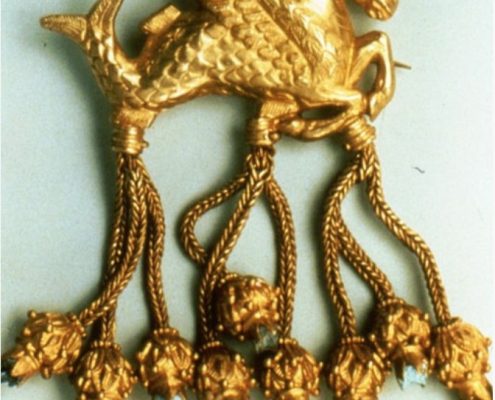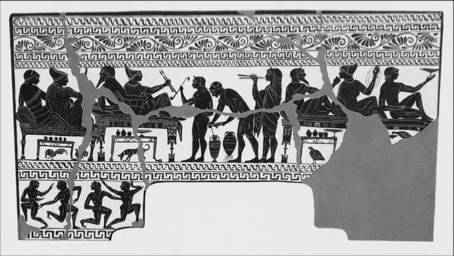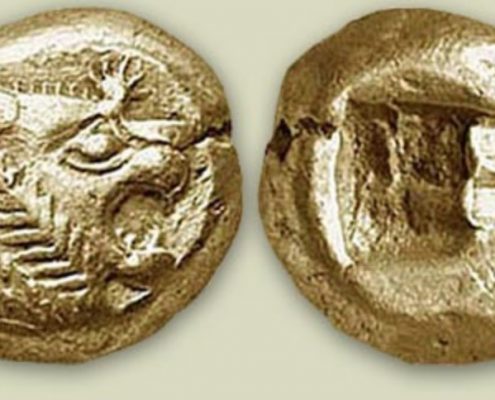Lydian Civilization
/0 Comments/in Travel & About /by Özlem Şimşek, Ph.D.Lydian Civilization, A Mighty Empire and its Cultural and Political Agenda
In the early 7th century BCE Gyges, the first king of Mermnad dynasty already had an imperial agenda and we observe that his ambitious project gained momentum in the following generations and Lydian Civilization became one of the superpowers of the world by the beginning of the 6th century BCE. was mighty, fabulously wealthy, and strong for a considerable long period of time in the eyes of others. Their capital Sardes was situated by rich Hermos river valley at the foot of Mount Tmolos in inland Aegean and river Pactolus flowed through the city. Lydia was renowned in ancient times for its lush valleys and bountiful agricultural land producing wheat, barley, olives, figs, and having productive vineyards. Its famous wines might be the origin of the cult of the Lydian god Baki or Bacchos.

Map of Lydia in the middle of 6th BCE.
Ancient sources inform us about the wealth of Lydian Kings and their prestigious offerings to Delphi. Gyges was called “rich in gold” by Archilochos (Archilochos, fr. 19). and apparently, the major source of wealth of the Lydians came from rich gold and electrum deposits controlled by the royal family.
Lydian Civilization & Luxury
Lydians are associated with a phenomenon known as habrosyne which can be described as the desire for owning luxurious goods, gained so much popularity that it became a lifestyle within the neighboring societies, specifically in Ionian cities by the middle of the century came from Lydia. New elite classes expressed themselves in expensive clothing, elaborate hair-dressing, perfumes and also delicacies such as good wine and fine foods. Literary sources (e.g. Sappho, Alkaios, Alkman, Hipponax, and Xenophanes) mention some elements of the luxuries of the Lydians: purple garments, elegant hairstyles, having false curls, wearing jewelry, and decorated leather slippers/boots and headbands, using soft beds, and all kinds of fragrances, incense, and exquisite scents. The custom of reclining banquet over “kline” may have gained popularity within the elite circles of Archaic Greece via Lydia. Aristocratically oriented poets like Sappho praise the luxury lifestyle. She idealized Lydians and described Lydian women wearing robes colored with expensive Phoenician purple dye, floral necklaces, decorated headbands, elaborate handmade leather boots, perfumes fit for a queen. (Fragments 19, 39, 94, 96, 98). In this manner of having the Lydian habits, the Greeks displayed the features of an elite and luxurious lifestyle.

Golden hippocampus, c. 560-547 (time of Croesus)
They influenced their neighbors.
It also found expression in burial grounds and sanctuaries where elite competition became evident. Adopting Lydian ways of behavior and owning Lydian luxurious goods not only took place in the Ionian cities that were within the close circle of Lydian Kingdom but also at some other regions in Asia Minor within the Lydian political and cultural spheres, such as Pisidia, Caria, Propontus and Phrygia and reached to mainland Greece. Lydia may have been a role model for neighboring societies for a century and the elites identified themselves with Lydia. They asked for fragrances and incenses “as used by Croesus” (Hipponax fr. 104.12).
We also observe the Lydian influence in cities such as Miletos, Chios, and particularly Samos that managed to stay out of the Lydian realm. Samian tyrant Polycrates was educated by an Ionian lyric poet Anacreon from Teos who was very fond of Lydian habrosyne and he resided at the court of Aiakes and Polycrates in Samos (Himerios, Oration, 29). In accordance with Athaneus, “Polycrates collected everything that was worth speaking of everywhere to gratify his luxury” (Athaneus, Deiphosoptistae, 12.540.g). He imitated effeminate practices of Lydians, built a street named Laura styled after the one in Sardis named Ankon, full of common women, all kinds of food to promote enjoyment (Athaneus, Deiphosoptistae, 12.540.f). In this case, we can certainly sense that there was a rivalry as well as envy.

Klazomenian sarcophagus found at Akanthos (Chalkidike), c. 540-500 B.C. ( Kaltsas 1996-1997, pl. 15). (Greeks wearing Lydian style turbans)
There were also occasional negative responses from the middling values of the Greek world to the Lydian imperial power and relating them with effeminacy, decadence, softness, weakness, which ultimately leads to failure and the fall of the cities and nations. Phockylides and Semonides did not appreciate luxury and luxury-oriented east, and Archilochus had no interest in Gyges’ wealth (Archilochos, fr. 19). Xenophanes mentions three Lydian habits that seemed to contaminate Colophonians: Purple garments, elaborate hairdressing, and fragrant scents (Xenophanes, fr. 3). Xenophanes may have been referring to Colophon during the 7th - 6th centuries when there were close imperial relations under the reigns of Gyges and Alyattes.
All these could be more than a natural process formed by the growing interaction of Lydia and Ionia. It was perhaps the wise political strategy of Lydians to manipulate the societies within their sphere. Habrosyne might have been a useful tool for pacifying and ruling the others. The elements of the Lydian lifestyle may have been a distinct tool for cultural expansion along with or without imperial inclination.
Lydian Civilization mint the earliest coins!
Perhaps the most significant contribution of Lydians was coinage. Herodotus mentioned that “Lydians were the first men whom we know who coined and used coins of gold and silver” (Herodotus I. 94). Xenophanes also informs that Lydians were the first to strike coins. Around 625 BCE, Lydians iconographically inspired by Near Eastern seals minted the first coins of electrum. This was a revolutionary invention providing a new conventional value to the metal beyond its intrinsic value. Clearly, this was another political move for Lydian hegemony in the region.

Early Lydian coins
However, “gods were jealous” in accordance with Herodotus. (Herodotus, I. 29-33). Despite the confidence of Croesus as stated by a Delphic oracle, "If Croesus goes to war against the Persians, he shall destroy a mighty empire” (Herodotus, I. 53-91), in 546 BCE he lost against the Persians and destroyed his own army, causing this mighty empire becoming a Persian province. Yet, the reflections of this golden past such as “as rich as Croesus” survive in public memory and their monetary practices still continue.











Leave a Reply
Want to join the discussion?Feel free to contribute!